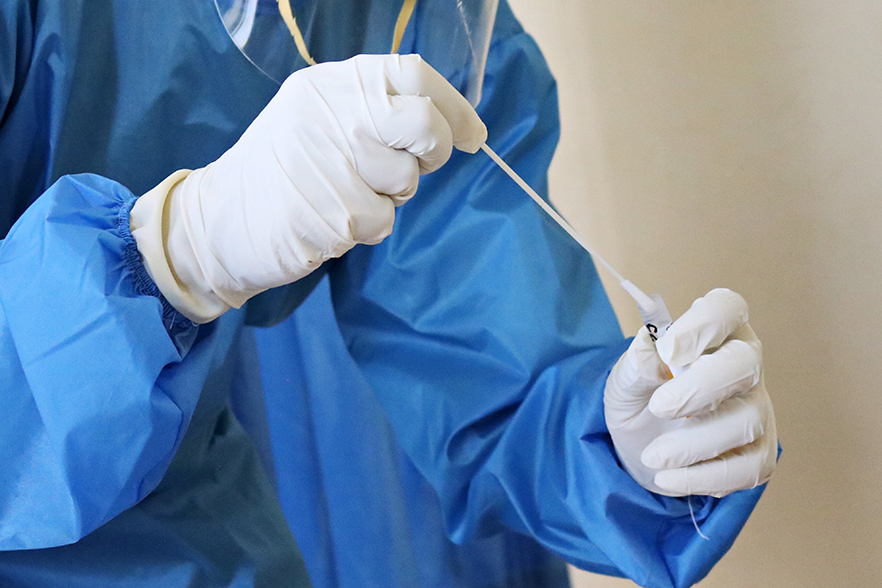
Since the start of the coronavirus pandemic, many studies published in the media have shown an increased risk of severe COVID-19 in people living with obesity.
This increased risk is down to existing challenges for those living with obesity, including:
-
- Limited availability of specialised obesity care within healthcare systems
- e.g. a lack of access to supportive weight loss programs
- Limited availability of specialised obesity care within healthcare systems
- Healthcare systems lacking inclusive design for those with higher BMIs
- Stigma related to weight and how this affects health-seeking behaviour
That said, the link between obesity and COVID-19 is far more complex than just existing healthcare challenges, so it’s important to understand the relationship between them — so you can make informed decisions to protect your health.
Why obesity is a risk factor for COVID-19
Living with obesity puts you at risk of other health conditions, like diabetes and heart disease, which are known to be linked to more severe COVID-19 symptoms and complications.
However, it has been shown that even when underlying health conditions like diabetes, heart disease and other factors like age and social class are considered, a high BMI is still linked to a higher risk of death from coronavirus infection. In fact, Public Health England reported that having a BMI of 35-40 increased the risk of dying from COVID-19 by 40%. Crucially, the higher the BMI, the higher the risk factor, and patients with a BMI greater than 40 were 90% more at risk.
So, why does living with obesity make your outcomes worse? We’ll explore the reasons below, but societal stigma against those living with obesity is one factor to be aware of.
How coronavirus affects the body in those with obesity
- Fat distribution: As BMI increases into the obesity category, fat distribution is not equal across the body; there are greater deposits of fat into the liver and muscles. This affects metabolism and can cause high levels of insulin to circulate in the blood. Higher levels of insulin can lead to diabetes or pre-diabetes, which are independent risk factors for poorer outcomes from COVID-19.
- Fat deposits in the lungs: Some research suggests that there may be increased fat in the lungs, which is one of the main areas where COVID-19 infection starts, and as such, this could affect the immune response.
- Increased blood clotting risk: Infections like COVID-19 increase the risk of blood clot formation, and obesity is another risk factor.
- Chronic, low-grade inflammation: Fat cells release chemical messengers called cytokines and attract white blood cells, which are part of the immune system. Increased cytokines and white blood cells cause inflammation. In COVID-19, the immune response also causes increased cytokine activity, which can cause severe symptoms. When there is already underlying inflammation, it compounds to increase symptom severity further.

Why people living with obesity are a higher coronavirus risk group
Many high-level studies, including meta analyses, have shown that there is more severe COVID-19 disease in people with obesity, linked to an increased risk of intensive care admission. One study showed that out of 10,465 patients with COVID-19, 73.7% were living with overweight or obesity.
Increased coronavirus risk of death
Being in the obesity category has been shown to increase the risk of death from COVID-19. One study showed that a BMI of 35 to 40 increased the risk of death from COVID-19 by 40%, and if the person’s BMI was over 40, the risk of death almost doubled compared to someone with a BMI of between 20-25. Understanding this risk is important so you can protect your health.
As well as the effects of COVID-19 on the body, there are also societal reasons why there may be a higher risk associated with those living with obesity:
Patient management limitations
The intensive care environment and set-up is not optimised for those with obesity, which may be why those with a higher BMI have poorer outcomes. These are the main issues:
- It’s more difficult to insert breathing tubes into patients with obesity, making it harder to help those with difficulty breathing
- Imaging can be harder to obtain if machine sizes are not suitable and harder to interpret
- Positioning / repositioning patients requires more staff
- Lying patients front-down (called proning) for those with obesity may cause discomfort, despite this being a method to aid breathing
There is also a strain on healthcare facilities, meaning care has been reduced:
- Fewer elective procedures like bariatric surgery
- Reduced access to multidisciplinary teams and specialist weight management clinics
Lack of weight loss programmes and resources
Lockdowns and social distancing guidelines mean that many people have gained weight. There has been reduced access to gyms, and a reduction in weight loss programmes and interventions. As people remain at home for longer periods of time, especially during self-isolation, this can lead to more physical inactivity for some, which increases the risk of metabolic diseases like obesity.

Restrictions imposed on physical activity
The restrictions related to the COVID-19 pandemic have shown a decrease in physical activity for a number of people. In fact, a UK survey of 5,800 people showed that 25% of people had lower physical activity levels than beforehand.
Increased reliance on processed food
It was also reported that self-isolation and worries about food availability resulted in people relying more on processed foods with longer shelf-lives rather than fresh produce. Canned foods were also popular and these contain higher quantities of sodium. Additionally, many people were comfort and stress–eating. Research has shown that emotional eating can lead to an increase in processed food consumption as well as the consumption of foods higher in sugar and fat.
Precautions to take for people living with obesity and COVID-19
- Prevention is always better than a cure. That’s why if you’re living with obesity, it’s paramount that you adhere to all social distancing guidelines, regularly wash your hands, and wear a face-covering when outside your house. Avoiding infection is the best way to prevent any potential complications. Taking the COVID-19 vaccination, when offered, is an effective way to get immunity to the virus and decreases the chance of serious illness.
- Try to stay active in whatever way you can. It doesn’t matter if you choose home workouts, a gentle walk or even if you take up running, any activity keeps you healthy. This can be a boost to both your mental and physical health.
- Try to eat more fresh produce rather than processed foods. If you enjoy cooking and baking, try new recipes and get experimenting! However, restrictive dieting should be avoided as this has been shown to actually lead to obesity rather than treating it.
- Join an online support group or forum if you’re feeling isolated. You’re not alone in this and connecting and sharing your experience with others can help you feel seen and heard. Also, talk to your doctor about services you may benefit from. Seeking help early is important if at any point you’re concerned for your health, including your mental health.
Most importantly, if you start to experience symptoms such as a dry cough, fever or shortness of breath — do get a COVID-19 test.